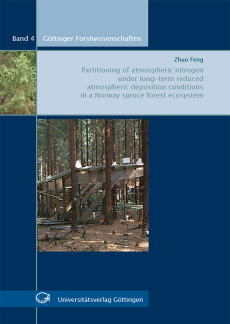Zhuo Feng
Partitioning of atmospheric nitrogen under long-term reduced atmospheric deposition conditions in a Norway spruce forest ecosystem
Reihe: Göttinger ForstwissenschaftenIn the past century, anthropogenic activities have increased N input drastically to terrestrial ecosystems and influenced the global N cycle. Especially temperate forest ecosystems are affected in their productivity, species composition, soil chemistry and water quality. N input to forest ecosystems is retained in trees and soil. Excessive N is leached out or released as gases. The retention of N input in soils is mainly influenced by the stability of soil organic matter (SOM). Many forests in central Europe and North America have been subjected to N saturation, i.e. excessive N appeared as nitrate in the leachate below the rooting zone. Reduction of atmospheric N emission and consequent atmospheric N deposition is proposed to be the only practical long-term solution to improve N-saturated forest ecosystems. However, responses of N-saturated forest ecosystems to reduced atmospheric N deposition have been seldom investigated. In the present study, atmospheric deposition was manipulated through roof constructions below the canopy of a mature Norway spruce forest on the Solling plateau in central Germany. A ¹⁵N tracer field and a density fractionation laboratory experiment were conducted in the present study to investigate the influence of long-term reduced atmospheric N deposition on the partitioning of atmospheric N in different forest ecosystem compartments as
well as on the partitioning of atmospheric N retained in the soil in different SOM pools.

